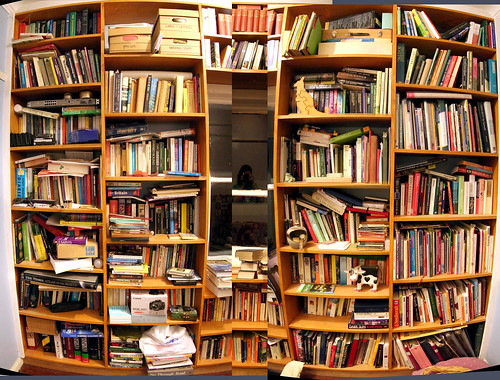I received an email from a colleague asking me to take a look at one of his
recent posts regarding libraries. In particular, he asked that I read a comment that was posted in response to his post. This blog post is a rebuttle to
dlp's comments.
I don't know when the last time you were in a library dlp, but libraries have been re-inventing themselves lately or at least trying to. It can be really hard when politicians seem to think that they are expendable. I recently had need of the services of not one but 2 public library systems. My experience made me thankful that they were still there and were staffed appropriately. I had help from librarians who went out of their way to help me find the things for which I was looking.
I'm sorry that you could never could find things -that's probably because when you were going to school, there was no qualified teacher-librarian to teach you the information literacy skills needed to find things. And if there was one and he/she was busy with administration all the time, it was probably an indication of lack of funding for support staff or there was a volunteer staffing the library. Is it the library's fault that the purse-string holders are short-sighted?
You also probably were never taught to ask the right questions to help you narrow your search and probably never taught what resources would be the best for your needs. Did you even have to think about whether or not a source was authoritative or reliable when you were in a library? You do when you are on the Interent. Anyone can put anything in a website/blog and there are no gatekeepers. Remember that there was and still are librarians who are choosing resources, making sure that they are dependable, are appropriate to the age level of the student/patron, buying from reputable print houses and publishers and making sure that there is balance in point of view. Who does this now for the Internet? This responsibility falls upon the user.
There is the assumption that everyone has the skills to critically evaluate what they are reading on the 'net. Everyone assumes that people /kids know how to research,
but they don't. And there is every indication that even though students today seem Internet savy, they still do not know how to tell when a site is legitimate or not or whether there are better sources of information. Are students going to go to sites like Library Spot? They don't. Their search behaviour consists of the following: Google a keyword, look at the first page, take something from the first 5 listings and if it's 'good enough' they're done. Instant gratification. We need libraries and librarians to teach and require students/patrons to get the best resources, not just the 'good enough' ones.
But what about the 'hidden internet'? How do you access this without libraries? University, public, school and hospital libraries pay for online databases for their patrons so they can have access to resources that are not freely available on the Internet. Most reputable publications do not post their content on the free'net. Who else but librarians and libraries are going make the hidden visible? And you can't get much more current than a database. In addition, these databases are stable - they are not going to disappear one day (like some websites). And you know what - they are available 24/7 and are free to patrons who have a library card - which by the way is free.
Libraries are not just about books. They are about equity in our society. What about people who do not have a computer at home with Internet access? Who do you think provides this sevice for those people? Not everyone can afford the technology. In fact, not everyone has a car to go around to yard sales or the money to spare even to pick up cheap books. We need libraries to ensure equity of access to information and books for all citizens.
Why, why ,why are libraries always a target of cost-cutting? Why in this day and age of information do we cut the one place that can provide guidance through this explosion of facts? Libraries are not a luxury. They are a need in this information age. It makes absolutely no sense that library funding is cut in an information age!
Libraries are not just about books anymore. They are Internet cafes and children's programming. They are places for adult literacy, new language learners and geneology research. They are online "Ask a Librarian" service providers where you can have access to a real live person to help point you in the right direction. They are a place of equity.
When people ask why we need libraries and librarians when there is the Internet, here's what I say:
Why do we need road maps when we have roads? Why do we need cookbooks when we have all the ingredients we could ever want from all over the world? Why do we need teachers when all the facts you could ever want are on the Internet?
Why indeed?










